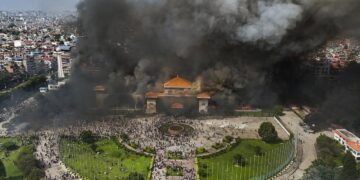Russia Says It Has Billions Of Indian Rupees That It Can’t Use

Russia has accumulated billions of rupees in Indian banks that it cannot use, Foreign Minister Sergey Lavrov said on Friday, pointing to a ballooning trade surplus with the South Asian nation.
“It’s a problem,” Lavrov told reporters in Goa on the sidelines of a meeting of the Shanghai Cooperation Organization. “We have to use this money. But for this, these rupees should be converted into another currency, which is now being discussed.”
India’s total exports to Russia fell 11.6% to $2.8 billion in the first 11 months of fiscal 2022-23, while imports rose nearly five-fold to $41.56 billion, data from the Ministry of Commerce and Industry showed. The uptick came as refiners last year discounted Russian oil, which had been shunned by the West in response to President Vladimir Putin’s invasion of Ukraine.
India’s Russian crude oil imports reached 1.68 million barrels per day in April, a six-fold increase from a year earlier, according to data intelligence firm Vortexa Ltd.
The Kremlin initially encouraged India to trade in national currencies following sanctions on Russian banks and a ban on transactions using the SWIFT messaging system.
But the volatility of the ruble soon after the war broke out meant plans for a rupee-ruble mechanism for oil imports were abandoned. India has resisted pressure from the US to cut ties with Moscow after its invasion of Ukraine.
‘Frozen Funds’
The imbalance in trade for Russia means “the amount of frozen funds can reach several billion dollars,” said Alexander Noble, director of the Institute of International Economics and Finance at the Ministry of Economic Development. “The situation is exacerbated by India’s historically high aggregate trade deficit, which reduces the possibility of clearing settlements with third countries.”
Russia is India’s largest supplier of arms and military hardware, although defense supplies to the South Asian country have been stalled by the lack of a payment mechanism that does not violate US sanctions.
Indian payments for more than $2 billion in arms have been stuck for about a year because New Delhi has been unable to pay the bill in dollars due to concerns that secondary sanctions could be eased, while Russia has been reluctant to accept rupees for purchases.
Oil refiners try to settle payments for discounted crude oil using UAE dirhams, rubles and rupees. Trades below the $60-a-barrel price ceiling set by the Group of Seven countries and their European Union partners are exempt from international restrictions.
Lenders opened special Vostro accounts at Russian banks, including Sberbank PJSC and VTB Bank PJSC, to facilitate foreign trade in rupees and keep crude oil flowing.
Bank of Russia governor Elvira Nabiullina said on April 28 that currency restrictions are making it difficult for Russian exporters to repatriate rupees.

















